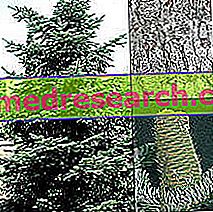
Scientific name
Abies pectinata DC or Abies alba Miller ; Picea abies Karsten
Family
Coniferae
Origin
North America; Northern Europe.
Used Parts
Needles, gems and young fresh tops.
Chemical constituents
- Essential oil rich in terpenes (limonene, fellandrene, borneol, pinene);
- Turpentine.
Spruce in Herbal Medicine: Fir properties
The essential oils of fir are used in the treatment of respiratory diseases due to their expectorant and balsamic properties, and are also used in the treatment of neuralgia, myalgia and rheumatism.
Biological activity
As mentioned, the essential oil of fir is ascribed secretolytic, balsamic, antiseptic, hyperemizing and anti-rheumatic properties. More precisely, all these activities are ascribed to the essential oil obtained from the needles, from the branches and from the fresh flowering tops of the plant; activities that have been confirmed by various studies carried out in this regard.
Thanks to these properties, fir essential oil is used for thoracic massages or in the form of fumigations in chronic catarrhal forms of the respiratory system (use not officially approved, although widespread) and for external massages against rheumatic pains and neuralgia (officially approved use).
Fir against neuralgia and rheumatism
As mentioned, thanks to the hyperemizing action of the essential fir oil, its external use has obtained official approval for the treatment of neuralgia and rheumatic pains.
However, it should be remembered that for the treatment of the aforementioned disorders, the essential fir oil should not be used pure, but properly diluted, in order to avoid sensitization reactions and skin irritations.
Fir in folk medicine and homeopathy
The balsamic and expectorant properties of the fir tree have always been known in folk medicine, which uses the plant to counteract airway disorders and as a remedy against phlegm. Externally, however, traditional medicine uses fir as a remedy for rheumatic pains, tears, bruises and strains; besides using it as an antiseptic, deodorant and stimulating remedy.
The fir also finds uses in gemmotherapy. In fact, the sprout of silver fir is indicated in delays and deficits of bone consolidation (in the case of rickets, bone fractures and delays in their consolidation, teething disorders, caries, paradontosis, juvenile and elderly osteoporosis, nutritional deficiencies in calcium of adults and cases of decalcification).
The fir is also used in homeopathic medicine, where it can be found in the form of granules and glyceric macerate. In this context, the fir is used in case of bone decalcification, rickets, pyorrhea and dental caries.
The amount of homeopathic remedy to be taken can vary from one individual to another, also depending on the type of disorder to be treated and the type of homeopathic preparation and dilution that is intended to be used.
Associations and complementary remedies
Catarrhal affections of the respiratory system: association of fir with dog rose in the nasopharyngitis, tracheobronchitis, sinusitis, tonsillitis, adenoids, otitis and in the stature-weight delays.
Affections at the bone level: with Birch in cases of weight-weight retardation, fractures, juvenile osteochondrites, rickets; with Birch and oak in cases of tooth decay, etc.
Side effects
If used correctly, silver fir and its essential oil should not cause any adverse effects.
However, fir essential oil may be responsible for skin irritation and bronchospasm, as well as possible irritative and / or allergic reactions both locally and systemically.
In case of internal intake of high doses of fir essential oil, on the other hand, poisoning can occur which is manifested by serious symptoms, such as: nausea, vomiting, diarrhea, increased salivation, thirst, sore throat, intestinal colic, dizziness, dyspnea, spasms, stranguria, dysuria, albuminuria and hematuria.
Contraindications
The use of fir essential oil is contraindicated in case of ascertained hypersensitivity to one or more components, in patients suffering from asthma, chronic obstructive pathologies of the airways and whooping cough.
Warnings
Due to the side effects and risk of intoxication that may occur, it is generally not recommended to use fir essential oil internally.



